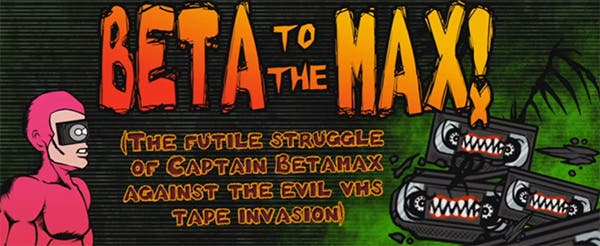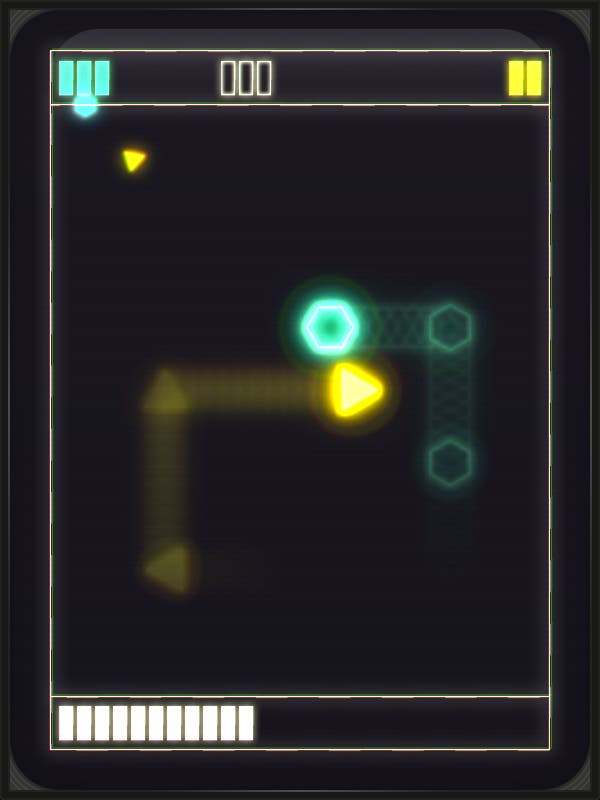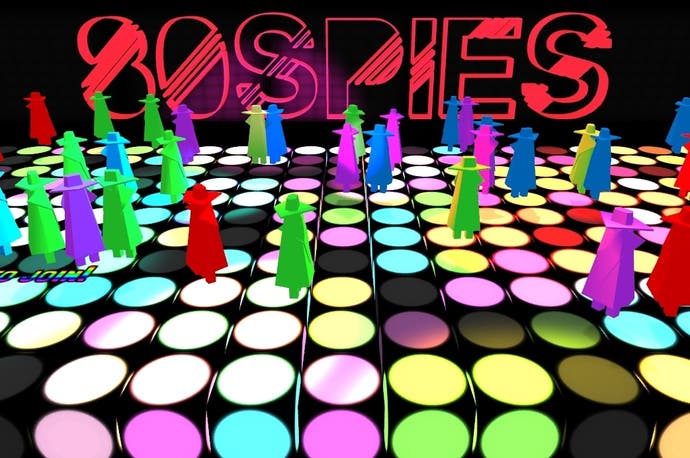Inside the Creative Assembly Game Jam 2013
Back to the 80s in Birmingham.
Birmingham's NEC was a strange old place last weekend. It wasn't necessarily the livestock show that took up one of the halls; I didn't get to check that out, though in my head it involved a fine heffer rotating slowly on a plinth, bathed in glorious light and surrounded by fawning farmers. It wasn't the many LED road signs pointing to Middle Earth; I did check those out, and they led to a car park that hosted a single Ginsters delivery van, somewhat disappointingly. It was that sitting alongside these was the dark half of Hall 9, where Rezzed had set-up shop, and where there was a fine selection of much of what's making gaming so exciting right now.
At one end there were squabbles of people noisily conspiring against each other as they played boardgames, while at another there were teams of developers quietly collaborating. This year's Game Jam, graciously hosted by Creative Assembly, was a quite savage affair, the tight time limits of other Jams whittled down to a brutal nine hours.
Who would willingly sacrifice an otherwise pleasant afternoon in Birmingham to put themselves under such pressure? They're an interesting, diverse bunch, the jammers: seasoned indies, father and son teams and those who jam just for the love of jamming, and the love of creating something tangible and new in the space of an afternoon.
Take Godjammit, a team led by Robin Baumgarten, a cheerful German who with his patterned grey jumper looked like he was set for a stint between the sticks at Italia 90. A PhD researcher at Imperial College by day, he's a keen programmer of indie games in his spare time, and it's at jams like this that he can get to work with like-minded people. Like Yuji Kosugi, for example, another part of the four man team, and someone who's only recently immersed himself in this world.
"I only got into games a few months ago - I used to be a management consultant, but I quite my job about a year and a half ago and tried to figure out what I wanted to do," Kosugi tells us. "Everyone was making indie games, so I thought why don't I make one as well? I started going to the London indie games pub night, and it's where I started meeting some of the guys I work with on this project and we started doing game jams."

Kosugi's a veteran of three jams now, and his experience has led him to a job at Beatnik, the London indie behind 2010's Plain Sight. Andrew Smith of Spilt Milk Studios heads up the Legion of the Jammed, and elsewhere there were teams like Force of Habit, stalwarts of numerous jams who craft games of striking quality.
Against all odds, it's a quality that was maintained at Rezzed's Game Jam. The nine hour limit's one thing, but so is being placed in the corner of a busy hall, being exhibited like a set of code-hurling monkeys at a zoo for everyone to prod and stare at. Then there are the more serious problems like flaky internet and a lack of power points. High drama indeed.
With time tight, there wasn't much room for the babble of banter that defines other Game Jams, and in its place was a quiet, studious atmosphere. "It was fun because people would walk by, people just attending the show and they'd be like what are those people doing?", says Kosugi. "And a lot of people just came to watch the show. If it were just a game jam you'd be mostly talking to other game jammers - but if you only have nine hours, you're not in too many situations where one team and another is talking and socializing."
The teams didn't get to share much time together, but they did share a brief: the brilliantly vague, wonderfully suggestive theme of the 1980s. Some interpretations were stricter than others, while some were entertainingly wayward.
Andrew Smith's Legion of the Jammed's take was the most straightforward, resulting in a game with all the brutal simplicity of the action flicks it took inspiration from. Tango Fiesta, a top down shooter that starred the likenesses of Dolph Lundgren, Sly Stallone, Arnold Schwarzenegger and, I think, Carl Weathers, takes the award for game I'd most like to play while drunkenly trying to wolf down a pile of kebab meat on a Friday night. It also wins the award for the most dubious stereotyping of Asians since, well, Sleeping Dogs, though Tango Fiesta's got a much smarter cover system so it's easily forgiven. Have a crack at it yourself.
Slightly more ambitious - in fact, a little too ambitious - was XMPT's Beta to the Max, an imaginative interactive take on the VHS/Betamax rivalry of the 80s. "Our game Beta to the Max is really pre-alpha to the max at best," apologised XMPT's Ed Moffat, but through the understandably rushed execution were some lovely ideas, with stages gradually eroding as the player rewound through them, and with the hero Captain Beta becoming a tracking blur in the process.
Equally grand in its ideas was Opposable Games' unnamed effort, which for ease of reference we'll just call Mirror's Edge 2.5. Set partly inside Dire Straits' Money for Nothing video and partly on a series of rooftops inspired by Dice's free-running adventure, the Oculus Rift-powered game was staggering not just for what it was trying to do but also because it somehow worked.
The Misfits, a team built around the father and son team of Philip and Thomas Trelford, also took inspiration from 80s music videos, though the end result was a little different. A ahemretro skateboarding rhythm-based endless runner game with churning synth-lines added by eleven-year old Thomas, We're Jammin' felt like a colourful offshoot of a Michel Gondry video, which is of course a very good thing.
It was Force of Habit's The Agent: Glory to Moscow that emerged as one of the real stars, though, a two-player game of cat and mouse told in bold colours transmitted through warm cathode filters. It's the kind of thing you'd expect to stumble upon when idly flicking through The Museum of Soviet Arcade Machines, and you can now try it for yourself.
Godjammit chanced upon something really special, though, seeking inspiration from the Cold War and taking it to strange places. "Most of the team's a little under 30, and we were 5, 6, 7 in the 80s so it's not a time we really remember," Kosugi says somewhat gallingly. "It wasn't a time we were very familiar with, so we were looking up old movies and games for inspiration. At first it was tough - we thought it would be hard to come up with something. It's hard to take something abstract like the 80s and then come up with a game mechanic."

So Godjammit reached into some of their personal histories, and, more specifically, to that of Baumgarten, who was raised in East Germany before the wall came down. "There's a story he told about his father, they would go to school and sometimes the students would be spying on the other ones and you could never tell who was doing that. It's something from his dad's generation, who would be spying on who in class."
80spies takes that rather bleak premise and puts it on the dancefloor. There are 80 spies - Godjammit took to interpreting the brief every which way it could - and in their midst are player controlled characters. It's a little like a primary colour cover of Spy Party, taking a proven premise and making it work in a pick up and play environment, and it was enough for judges Ed Stern, Chris Avellone and Keith Stuart to declare it as the winner of this year's Game Jam.
"It was actually really stressful," reflects Kosugi. "I was kind of frustrated at the end - I put in some different gameplay modes and was hoping we'd be able to playtest them to figure out which one's best, but we just had to go with the first one that we put in. It was pretty intense."
Those modes have since been added, and Kosugi, Baumgrten and team are still working on 80spies with the intention to turn it into a full game. A playable build is available for all, with keyboard control allowing up to two players at any one time. The eventual goal is to get it on Ouya, an environment where multiple game controllers are perhaps more commonplace, and where the premise can be opened up a little.
It's the kind of odd curio you probably wouldn't mind picking up for an afternoon of multiplayer fun if you've an Ouya in your living room - and if you ever do, remember where 80spies started: in a small cramped corner of one of Birmingham NEC's halls, where Godjammit conjured up something pretty special.


